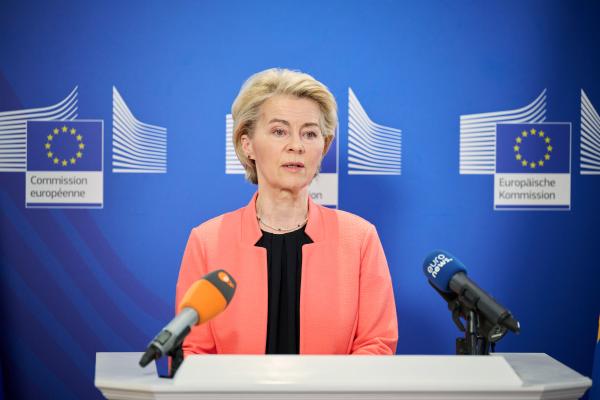President Donald Trump yesterday announced the implementation of a sweeping 10% tariff on all imports entering the United States, a move he framed as a measure to protect American industries and address trade imbalances. In a Rose Garden speech at the White House, Trump declared the policy a “Liberation Day” for the U.S. economy.
In addition to the universal 10% tariff, the administration is imposing reciprocal duties targeting 60 countries identified as contributing to trade disparities. These additional tariffs—set to take effect on April 9—will be levied at rates mirroring approximately 50% of the duties those nations impose on U.S. exports. Notably, China faces a steep 34% tariff, the European Union 20%, and the United Kingdom the baseline 10%.
Impact on Europe: A Major Economic Disruption
For the European Union, the new tariffs pose a significant economic challenge. Germany’s automotive exports, France’s luxury goods sector, and Italy’s machinery industry—all key players in transatlantic trade—now face a 20% tariff on top of the universal 10% duty. Smaller economies like Ireland, heavily reliant on pharmaceuticals, and the Netherlands, a major technology hub, are also deeply affected. With the EU’s robust export market to the U.S. suddenly at risk, billions in trade and thousands of jobs are now under threat.
EU’s Strong Reaction: Condemnation and Retaliatory Measures
European Commission President Ursula von der Leyen swiftly condemned the move, calling it “a major blow to the world economy.” In a statement, she warned that the tariffs would fuel global uncertainty and protectionism, driving up costs for consumers. “Millions of citizens will face higher grocery bills, medication will cost more, and inflation will rise,” von der Leyen cautioned, emphasizing that the economic burden would fall hardest on the most vulnerable populations.
The EU is now preparing countermeasures. Drawing on past responses to U.S. steel tariffs, von der Leyen announced that Brussels is “ready to take further action” if diplomatic negotiations fail. The Commission is also monitoring potential market disruptions, such as dumping from third-party countries, and has pledged swift intervention. “We are prepared to protect our interests and our businesses,” she asserted, signaling a firm stance against Washington’s tariff escalation.
A Call for Dialogue Amidst Tensions
Despite acknowledging flaws in global trade rules—one of Trump’s key justifications for the tariffs—von der Leyen rejected tariffs as a viable solution. “Reaching for tariffs as your first and last tool will not fix it,” she said, urging Washington to engage in dialogue instead. EU Trade Commissioner Maroš Šefčovič is already in talks with U.S. counterparts, seeking avenues to de-escalate the situation.
Meanwhile, the EU has taken defensive measures, including limits on tariff-free steel imports and strategic discussions with key sectors such as automotive and pharmaceuticals. As the economic standoff intensifies, von der Leyen called for European unity, declaring, “If you take on one of us, you take on all of us.” She reaffirmed the EU’s strength as a 450-million-strong single market and pledged unwavering support for industries and workers affected by the tariffs.
The Road Ahead: A Test for Transatlantic Relations
While the EU remains open to negotiation, Brussels is bracing for the economic storm set off by Trump’s “Liberation Day” tariffs. The move not only disrupts decades of trade cooperation but also tests the resilience of transatlantic relations. As tensions rise, Europe stands determined to weather the chaos, defending its industries while keeping the door open for diplomatic solutions.
A global media for the latest news, entertainment, music fashion, and more.




